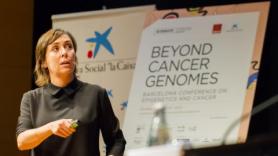Nowadays there are very few doubts as to the fundamental role genes play in the onset and spread of cancer. Nevertheless, just reading the letters they are made up of doesn't seem to be enough to fully understand it.
Epigenetics, the study of hereditary changes that are not dependent on the DNA sequence, is shaping up to be key in rounding out the landscape, because it explains how it is regulated and organized. This field has allowed scientists to observe the genome not as a linear book but as a 3-D pop-up, with regulatory sequences, switches and long-distance relationships. Plus, it has helped explain the phenomena of cancer stem cells, which are key cells that seem to start the process and resist chemotherapy. In fact, the latest studies show that many cancerous mutations are found not in genes but in the regions that regulate them, what has been called the dark genome. And several promising treatments are being developed based on these discoveries.
A group of top experts from around the world came together on 13 and 14 October 2016 to discuss some of the latest, most important advances in this arena at the debate ‘Beyond Cancer Genomes. Barcelona Conference on Epigenetics and Cancer’, organized by B·Debate – an initiative of Biocat and the “la Caixa” Foundation to promote scientific debate – with the Institute for Research in Biomedicine (IRB Barcelona), and collaboration from the Molecular Biology Institute of Barcelona (CSIC), Institute of Predictive and Personalized Medicine of Cancer (IMPPC), Cancer Epigenetics and Biology Program (PEBC; IDIBELL) and Center for Genomic Regulation (CRG).
CONCLUSIONS
- Mass cancer sequencing projects are showing that many mutations are found not in the genes but in the regions that regulate them, known as the "dark genome".
- Epigenetics regulates DNA activity and part of its 3-D structure. Recent studies show that the genome is structured into insulated, independent neighborhoods, with up to one million switches.
- Cancer stem cells seem to be the origin of tumors and play a key role in resistance to treatment. Similar cells may trigger metastasis and be fat dependent, a clear link to diet.
- Some of the most promising therapies target "Myc", a protein altered in cancer patients that controls up to 15% of the genome and until recently was considered untouchable.



